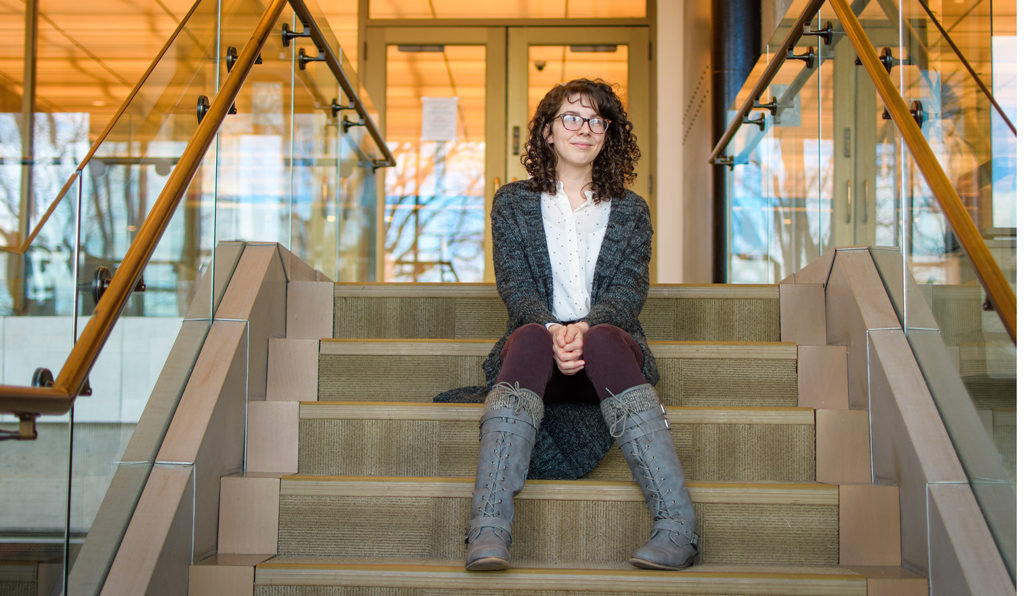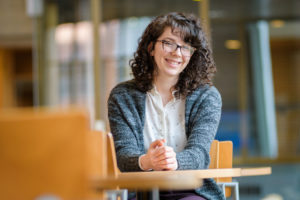In new era of global climate action, Kortni Wroten takes charge

Kortni Wroten isn’t one to sit back and just watch things happen.
She’s on a crusade to stop climate change.
Wroten knows the solution lies in leveraging the collective power of grassroots, local initiatives. “If you have something that bothers you, spark a conversation,” she says. “Don’t be afraid to use your voice — it’s one of your most powerful tools to effect change.”
The dual MBA and M.S. in environmental science and policy student made her voice heard at the COP24 UN climate conference in December.
As Clark University’s first-ever student delegate, Wroten immersed herself in international climate policy alongside the world’s leading activists, researchers, and experts.
The two-week long event held in Katowice, Poland, focused on the creation of guidelines to combat the impacts of climate change, including negotiations on the rules to govern the 2015 Paris Agreement. Although President Trump announced his intentions to withdraw the United States from the Paris Agreement in 2020, Wroten and other American delegates moved forward on non-federal climate action.
Wroten is taking a stand, with or without the administration, to promote climate change mitigation efforts. “The environment is our future, and does not have a voice to represent itself,” she says. “I strive to be that voice for the planet and stand up for what is right.”
Even when Wroten experienced frustrations with the slow pace of negotiations, she found inspiration in the climate protests occurring outside of the COP24 venue. “After experiencing the protests and the moving words of my fellow advocates, I learned that if we want this to be a movement, we need it to be inclusive, honest, and transparent.”
The passion and political inertia demonstrated at COP24 imbued Wroten with renewed hope for the future of climate action.
She was encouraged to learn from other individuals, businesses, and cities that are moving forward with their solutions to combat climate change. “It’s so emboldening to see environmental advocates pushing for more progress instead of settling for the status quo,” Wroten says. “Young people everywhere are not taking it sitting down — we are fighting for a better world and a better system.”
The opportunity to participate in COP24 arose out of a directed study course, International Climate Negotiation, which focused on international policy and progress. The multi-institution course was co-taught by Elisabeth Gilmore, associate professor in Clark’s International Development, Community and Environment (IDCE) Department, and Gillian Bowser, a natural resources professor at Colorado State University.
During her presentation at a U.N. official side event, “Students and Youth Researching and Advocating for Climate Action, Equity, and Global Justice,” Wroten explored youth perspectives on agriculture and food justice. She discussed Worcester’s local youth-led food initiatives, including Clark’s student-run Local Root program and the city’s Regional Environmental Council YouthGrow program. Both initiatives address local food justice issues and empower youth through community and climate action. In addition, Wroten presented at a U.N. Pavilion event, “Food for our Future,” where she tied in Worcester’s initiatives to the efforts of the recent IPCC 1.5 Special Report.
“I focused on elevating the efforts of my peers and the neighborhood to raise awareness and recognition — but also to inspire others that local, small-scale change is actually quite impactful,” she says.
Wroten’s call-to-action rang loud and clear.
After the event, she was approached by two students from the Netherlands who asked for insight and advice for launching their own urban agriculture initiatives. “It was so rewarding to see that our initiatives here in Worcester were able to inspire change internationally,” Wroten says.

She credits the experiential structure of her graduate program to her success at COP24.
“This degree program highlights a focus on pragmatic solutions while incorporating important sociological elements of the climate change phenomenon,” she says. “I am garnering the real-world experience necessary to expand my skill set and strengthen my resume, so that I will be comfortable with this type of work when I graduate.”
Wroten returned to Worcester more inspired and determined to focus her efforts on environmental planning and sustainable development.
“Attending the COP showed me the promise of technology being developed to mitigate and adapt to climate change,” she says. Wroten plans to work further on issues of advocacy and community organizing. “I would like to focus my efforts on adaptation in the wake of oncoming climate disasters, particularly for vulnerable communities,” she says.
“If you see something that you wish was better, you have the power to make that change yourself. That change may seem insignificant, but it has more power than you know,” she says. “If you wish something were being done in your city or on campus, start an initiative. If you are unsatisfied with politicians, run for office.”
If there’s one thing Wroten wants known, it’s that an individual voice can change the world, and it’s time for yours to be heard.


